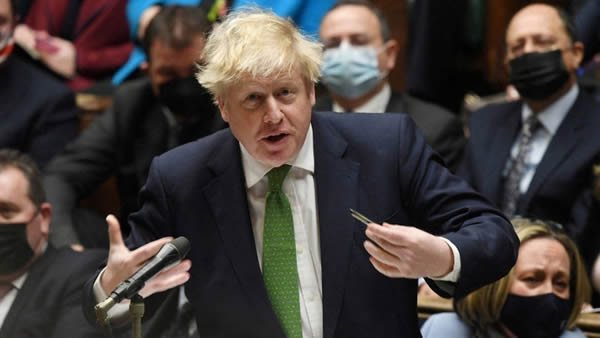
Boris Johnson is fighting for political survival after two of his top ministers attacked his leadership and resigned.
Chancellor Rishi Sunak and Health Secretary Sajid Javid quit within 10 minutes of each other, followed by a flurry of junior ministers and aides.
Critics said it was “over” for the prime minister, while Labour said the party he led was corrupted.
But a No 10 source said Mr Johnson was determined to continue in office and “deliver what he promised the people”.
In a move to shore up his government with a cabinet reshuffle, he named Nadhim Zahawi as the new chancellor, while the prime minister’s chief of staff, Steve Barclay, has become health secretary.
Mr Johnson will come under further pressure later on Wednesday as he faces MPs at Prime Minister’s Questions.
He is also due to give evidence to the Liaison Committee – a group of MPs who scrutinise the government’s policy and decisions.
Bim Afolami – who quit as vice-chair of the party live on TV on Tuesday evening – said Downing Street’s handling of the Chris Pincher affair had been “really appalling” and he could no longer “defend that sort of behaviour”.
He told BBC Radio 4’s Today programme he supported Mr Johnson in his recent confidence vote in order to give him time to rebuild trust after Partygate, but things had “got a lot worse” in recent weeks.
Neither Mr Javid nor Mr Sunak have publicly spoken since standing down, but their resignation letters on Tuesday were highly critical of the PM.
Mr Javid warned the leadership was not “acting in the national interest”, while Mr Sunak said the public expected government to be conducted “properly, competently and seriously”.
Opposition party leaders urged cabinet ministers to join the pair and resign, and Labour leader Sir Keir Starmer said he was ready for a snap general election.
Conservative MP and former chief whip, Andrew Mitchell, told BBC Newsnight it was “over” for Mr Johnson, saying “he has neither the character nor the temperament to be our prime minister” – and the only question was how long the affair would go on.
But no Tory MPs have declared a leadership challenge against the prime minister and several ministers have rallied around the PM, including Foreign Secretary Liz Truss – one potential contender to replace him as Tory leader.
She said she was “100% behind the PM”, while cabinet ministers including Dominic Raab, Michael Gove, Therese Coffey and Ben Wallace also indicated they would be staying in the government.
Tory backbencher Daniel Kawczynski suggested the resignations would ultimately strengthen Mr Johnson’s position, adding they “could have triggered an avalanche against the prime minister but it hasn’t”.
The political drama unfolded on Tuesday evening, just minutes after Mr Johnson gave an interview to the BBC in which he admitted he had made a “bad mistake” in appointing Chris Pincher as deputy chief whip in February this year despite being aware of misconduct allegations against him.
It followed days of changing responses from No 10 over what exactly Mr Johnson knew about the allegations facing Mr Pincher when he gave him the job.
The row is the latest issue to prompt Conservative MPs to question the prime minister’s leadership and direction of government.
Mr Johnson’s government has been dogged by a series of controversies in recent months, not least by a police investigation into parties in Downing Street during lockdown.
Some Tory MPs have also expressed dissent over tax rises, the government’s response to rising living costs and its policy direction.
Mr Sunak referenced tensions over the economy in his resignation letter, telling the PM: “In preparation for our proposed joint speech on the economy next week, it has become clear to me that our approaches are fundamentally too different.”
The departures triggered a wave of resignations by junior Tories, including Mr Afolami, Solicitor General Alex Chalk, and four ministerial aides.
Pressure on the prime minister was also elevated last month by the loss of by-elections in Tiverton and Honiton and Wakefield and the resignation of Conservative Party chairman Oliver Dowden.
And the resignations come just weeks after he survived a no-confidence vote.
The PM is immune from a Conservative leadership challenge until June next year under party rules, after he won 59% of the vote.
But Tory rebels opposed to Mr Johnson’s leadership are attempting to force a change in party rules to scrap the year-long gap between formal leadership challenges.
They want to use the upcoming elections to the 1922 Committee of backbench Tory MPs to vote in members who would be willing to change the rules.
Conservative MP Andrew Bridgen told the BBC the prime minister should resign and if he does not do so “the party will have to force him out”.
“The 1922 committee will deal with this turbulent prime minister, it’s what it was created for,” he said.
Meanwhile, Labour leader Sir Keir said he would welcome a snap election and the country needed a change of government.
He said: “After all the sleaze, all the failure, it’s clear that this Tory government is now collapsing.”
The next general election is expected to be held in 2024 but could be earlier if Mr Johnson used his powers to call one.
Leader of the Liberal Democrats Sir Ed Davey told the BBC that Conservatives must do their “patriotic duty” and “get rid of Boris Johnson today”.
Scottish First Minister and SNP leader Nicola Sturgeon said “the whole rotten lot” in Mr Johnson’s government should go, accusing ministers of “lying to the public”.
Source: BBC























